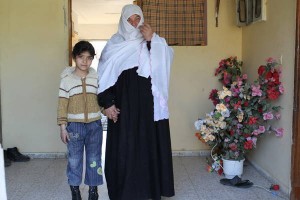People living in Israeli buffer zone with Gaza “suffering from everything”
(This is Part 8 in a series. Gerri Haynes, a former president of Washington Physicians for Social Responsibility, has been sending back reports from inside blockaded Gaza. As she did twice before, Gerri organized a team of doctors and other health care providers to work in hospitals and clinics in Gaza in an effort to directly help the people there and to bring attention to the ongoing humanitarian crisis that the Israeli blockade has created.)
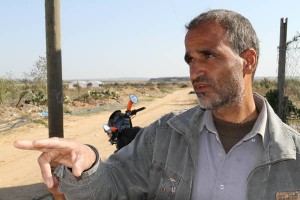
Nabil once had a home in an area of conflict in southern Gaza. It was destroyed but he still visits some of his land just to tend crops. (Bob Haynes photo)
A team of doctors from the Advanced Mobile Clinic of PMRS has traveled to see patients in an area near Rafah very close to the “no-go” zone across from the border with Israel. No other medical teams serve this dangerous agricultural area. On a regular basis, rockets leave and missiles enter. During Operation Cast Lead (2008/2009), 200 homes were destroyed here.
Nabil’s home is gone; his leg was injured during the attacks by Israel, but he appears to have recovered. Now, he travels from his brother’s home in Khan Younis every day to tend the crops he has replanted. Even so, much of his land lies to the east in the area forbidden to him by Israel.
For the 2,000 people who live in damaged or make-shift homes in this area, the possibility of being caught in the middle of lethal conflict is constant.
Nabil says, “We are suffering from everything, not just health, water, lack of security – everything.”
He gives us this example: A child living here developed a high fever. The parents called for an ambulance but they were told that an ambulance cannot come to this area in the night – they would have to walk to a place of care (miles away.) There are no police in this area to protect them.
As we walk West of the clinic, we are greeted by Um Suhail. She greets Dr. Mohamed warmly and invites us to visit her home. Outside her bullet-riddled home, there is a pen containing several beautiful birds. I watch and listen to them and Dr. Mohamed says, “These people love life.” Um Suhail tells us, “The Israelis do not allow us to be in the life. Sometimes they open fire on us when we sit here with our family at night. We are suffering from both the Israelis and the Palestinians because the rockets fill the area. I told the Israelis that we do not support Hamas or Fatah. One Israeli soldier told me that I must support Hamas by my vote – that all Gazans are Hamas. We are suffering a lot.”Next to Um Suhail’s house, we see a large rectangular pool lined with plastic. Water for irrigation is collected here and a series of plastic irrigation pipes has been constructed by a business man from Rafah – providing water for the olive and fruit trees, peas, cabbage and cauliflower grown here.
There seems to be awareness that the soil may be contaminated by unclean water as well as by toxins from the white phosphorus and other agents used during Cast Lead and since, but crops are needed. Because unemployment in Gaza is extreme (we have heard from 45-80 percent, depending on the ages included in the statistic), sale of produce is limited and incomes from farming are very low.
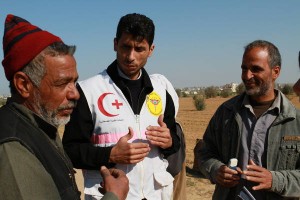
Abu Hani, left, also had a home in the zone that was destroyed by Israel. He tells Dr. Mohamed, center, and Nabil that he still works his nearby land despite the daily danger from Israeli attacks. (Bob Haynes photo)
He says, “I spend my time in the land. The market is very weak and export is impossible under the siege. People have nothing and there is no work in Gaza for my son or family. The main problem is the siege and the occupation. Some NGOs help by giving us saplings for our orchards, but no money. I have a son in an Israeli prison. He has been there since he was kidnapped from his home following the capture of Gilad Shalit. He is married and has one daughter and one son. I have not seen him for four years. The Red Cross gives him messages from us every four months – we tell him we are well and he tells us he is suffering.”
Abu Hani continues: “The land is ill because of the war. There are poisons in the soil. The harvest of olives and grapes is low. Before the attacks, my harvest was big. Now even the rain is less. But the main problem is the siege. We are peaceful people. We like peace. We hate war. I hate the attacks and the destroying of my home and my land. War and the attacks mean killing and destroying and this affects me as a person. Israelis make rumors that Gazans are terrorists, but we like peace. If the gate is open, I would like to send my son to Germany to study. Please tell your people, tell your family, that you met peaceful people in Gaza.”
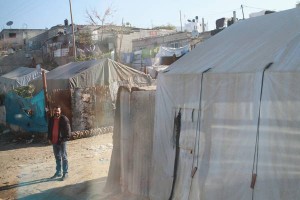
The Israeli blockade, among many other things, has created a dire shortage of construction materials. Gazans make do with tents, plastic, mud and whatever else they can. (Bob Haynes photo)
Dr. Mohamed tells us these people do not register on a poverty scale, their poverty is so great. Still, we are met by the smiling and gracious Fatima, a woman known to Dr. Mohamed as a patient. She speaks to us of her life and invites us into her home – a cement rectangle divided into an empty room for gathering, four bedrooms leading directly from the empty room, and a tiny cooking area. More than twenty people live in this space. Married sons and their families each have one of the small bedroom with as many as seven people per room. Before we leave, Fatima insists on serving us cola,- then hugs and kisses us “Good-bye.”
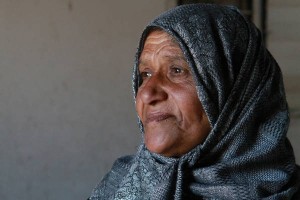
Smiling and gracious, Fatima, a woman known to Dr. Mohamed as a patient, welcomed the group into her tiny home, which was shared with more than 20 other members of her extended family. (Bob Haynes photo)
The young man tells us that his father left the family and now it is his responsibility to feed this family of six. Because there are extremely few employment opportunities in Gaza, the family often goes without food. Last week, he says, they had no food for three days.
UNRWA helps them every three months, but what they receive is not enough to last and they are often hungry.
Dr. Don Mellman writes this blog: As a neurosurgeon, I have a “private practice” in Gaza. There are patients who learn of my being here and make individual arrangements to be seen. One patient was seen in his home on our last visit to Gaza and I will see him again before we leave… house calls in Gaza.
Besides consulting in surgery, Don has provided consultation in the intensive care unit and will consult in the neurosurgery clinic at Shifa hospital. This is a clinic for problem cases in neurosurgery.
Because of his experience working with neurosurgeons in Gaza, Don says he has great respect for and a very high opinion of their knowledge, skills, judgment and ability to work under extremely adverse conditions.
RSS feed for comments on this post. TrackBack URI
